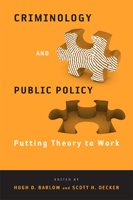![]()
![]() Examines the links between criminological theory and criminal justice policy and practice
Examines the links between criminological theory and criminal justice policy and practice![]()
![]()
![]()
![]() Examines the links between criminological theory and criminal justice policy and practice
Examines the links between criminological theory and criminal justice policy and practice![]()
![]()
 |
Criminology and Public PolicyPutting Theory to Workedited by Hugh D. Barlow and Scott H. Deckerpaper EAN: 978-1-43990-007-9 (ISBN: 1-4399-00078) |
"If this book doesn�t fascinate you, crime control policy is not your subject. The editors and contributors do a wonderful job of illuminating criminological theory, while never forgetting good theory should inform good policy. The ideas in Criminology and Public Policy should go a long way in helping us finally get crime policy right."
—Brian J. Ostrom, Principal Research Consultant, National Center for State Courts
Crime policy ought to be guided by science rather than ideology, argue Hugh Barlow and Scott Decker in this incisive and original collection of essays. Establishing the value and importance of linking theory and practice, the contributors to Criminology and Public Policy provide a comprehensive treatment of the major theories in criminology and their implications for criminal justice, crime control, and the larger realm of justice.
In applying theories to real world issues—such as reducing crime and violence, prisoner reentry policies, gang behavior, and treatment courts—the contributors take both a macro and micro level approach. They find, too, that it is often difficult to turn theory into practice. Still, the very attempt pushes the criminal justice system toward workable solutions rather than ideological approaches, an orientation the editors believe will lead to greater progress in combating one of our society�s greatest difficulties.
Contributors include: Robert Agnew, Ronald L. Akers, Gordon Bazemore, Ronald V. Clarke, J. Heith Copes, Frank Cullen, Marcus Felson, Marie Griffin, Scott Jacques, David Kauzlarich, Jean McGloin, Steven Messner, Alex Piquero, Nicole Leeper Piquero, Nancy Rodriguez, Richard B. Rosenfeld, Dawn Rothe, Andrea Schoepfer, Neal Shover, Cassia Spohn, Katherine Tellis, Charles Tittle, Richard Wright, and the editors.
Excerpt available at www.temple.edu/tempress
"This well-edited, highly readable book clearly demonstrates how criminological theory can, and does, contribute to policy solutions. Prominent scholars provide succinct summaries of current theories and innovative policy implications for crimes ranging from state crime to street crime. Criminology and public policy students should read this book, as should policy makers and criminal justice professionals."
—Margaret A. Zahn, Professor of Sociology, North Carolina State University, and past president of the American Society of Criminology
"Criminology and Public Policy will fill a significant void in academic criminology and in theory- and research-based practice in the field"
—John Klofas, Professor of Criminal Justice and Chair of the Department, Rochester Institute of Technology
"The editors of this book are to be commended for inviting some key theorists to 'think policy.'... The contributors make apparent the distance between professional criminology and policy makers.... Summing Up: Recommended."
—CHOICE
"Criminologists should gain confidence that criminological theorizing is not an empty exercise; it can both help to understand that social world and change it."
—Contemporary Sociology
Also available in e-book
Foreword, by Francis T. Cullen
Preface
Part One. The Policy Implications of General Theories of Crime
Introduction to Part 1: Putting Criminological Theory into Practice
1. Control Balance Theory and Social Policy
2. Controlling Crime: Recommendations from General Strain Theory
3. The Normal Crime Rate, the Economy, and Mass Incarceration: An Institutional-Anomie Perspective on Crime-Control Policy
4. A General Theory of Crime and Public Policy
5. Nothing Is as Practical as a Good Theory: Social Learning and the Treatment and Prevention of Delinquency
6. Routine Precautions, Criminology, and Crime Prevention
Part Two. The Policy Implications of Theory Applied to Specific Crime Types
Introduction to Part II: Impact of Theory and Policy on Key Criminological Issues
7. Decision Making by Persistent Thieves and Crime Control Policy
8. Theories of Gang Behavior and Public Policy
9. State Crime Theory and Control
10. Theories of White-Collar Crime and Public Policy
11. Drug Law and Violent Retaliation
12. Feminist Criminology: Beyond the Slaying of Demons
13. Critical Race Perspectives: Explaining the Differential Treatment of
Racial Minorities by the Criminal Justice System
14. Problem Solving Restorative Justice: From Incidents and Cases to Community Building and Collective Outcomes in a New Response to Youth Crime
Contributors
Index
 | Hugh D. Barlow is Professor Emeritus, Southern Illinois University Edwardsville. He is the author of Dead for Good: Martyrdom and the Rise of the Suicide Bomber and Introduction to Criminology (with David Kauzlarich). |
 | Scott H. Decker is Professor of Criminology and Criminal Justice at Arizona State University. He is the author of Life in the Gang: Family, Friends and Violence and co-author (with Margaret Townsend Chapman) of Drug Smugglers on Drug Smuggling: Lessons from the Inside (Temple). |
Law and Criminology
Political Science and Public Policy
© 2015 Temple University. All Rights Reserved. This page: http://www.temple.edu/tempress/titles/2026_reg.html.